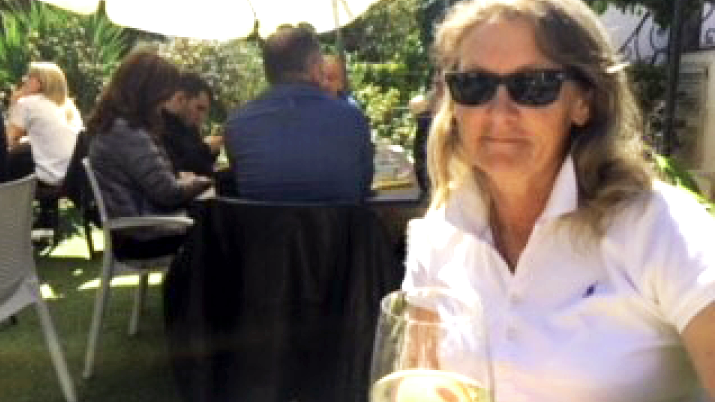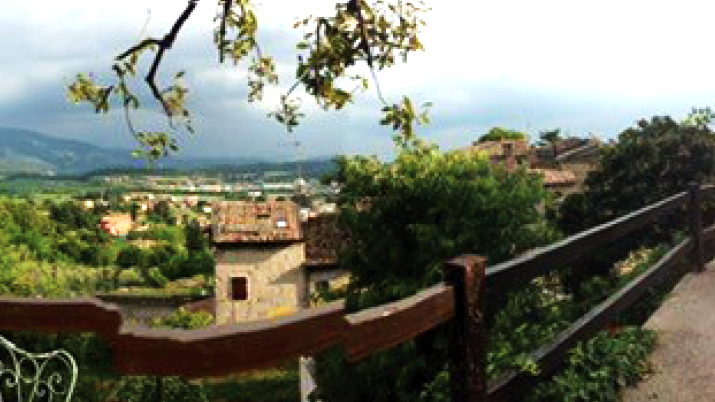Jessie Horner, a retired lawyer and student of Italian 401: Advanced Studies in Italian Language and Style, demonstrates how learning new languages and cultures can benefit people from different walks of life, including those in retirement.


Jessie Horner drinking falinghina for the first time in Anacapri, Italy.
Why did you study Italian?
“I have always been intrigued by foreign languages. It seems so wonderfully private, until you realize that whole nations speak your secret language.”
After retiring in 2016, my husband and I took an extended trip to Europe which included an amazing three-week stay in Gaon, a tiny village on the side of Monte Baldi near Lago di Garda in Italy. It was supposed to be a house exchange with a friend of a friend, but the family who owned the home was living nearby, in Verona, so we ended up spending a lot of time with them going for walks, drives, dinners, and even a high school Shakespeare play and an anniversary party. We were eager to contribute our side of the exchange, but the husband of that family was reluctant to come to Canada as he spoke no English at all. I joked that if they would come, I would learn Italian.
Somehow, I found out about UBC’s extremely generous program of free classes for seniors and I was lucky enough to be able to enroll in ITAL 101 with Monica that fall. By then, I had fallen in love with Italy—who wouldn’t?—and pretty quickly seemed to fall in love with the language too—again, who wouldn’t?!
I have always been intrigued by foreign languages. It seems so wonderfully private, until you realize that whole nations speak your secret language. It is an absolute thrill to be able to understand and communicate with someone from such a different world.


View from the house in Gaon, Italy.
What are your favourite aspects of UBC’s Italian classes?
“It's not just learning a language, its more like having another life—a completely different one—through the richness of Italian art and culture, and the complexity of Italian history, in addition to the obvious delights of Italy’s food and wine.”
The experiences have been all-round wonderful.
It was a little strange to begin with. At first, I was a bit embarrassed to be there in the company of other students who were young enough, not to be my kids, but my grandkids. But I really give all my professors huge credit for making me feel welcome and comfortable. I was delighted to discover a few people even older than me—but we maintained and developed a rapport with students of all ages.
I saw several great films in my first years—some in class, some as part of the FHIS film series and some associated with the Vancouver International Film Festival, and they helped “reel” me in—literally and figuratively. I really enjoyed a lot of the music we were introduced to; Mina stands out, but also many popular singers.
I really enjoyed the writing exercises. There were opportunities to reflect on things I wouldn’t have thought about for years—and to do that in Italian seemed to add some lustre to my thoughts and experiences. Reading Jhumpa Lahiri’s book In Altre Parole with Elena was a real highlight, as were some of the intensely interesting aspects of Italian history and modern life that we were able to handle in the fourth-year course with Luisa.
It has been fascinating to meet students from other universities—and I have an 18-year-old Zoom pal in Italy who has given me some new perspectives. I have made some very good friends through these classes and we continue to get together on Zoom on a regular basis, sometimes just to chat—always in Italian—and sometimes to do grammar exercises. It’s a wonderful group and I value them greatly.
I learned a great new step in making focaccia and have also acquired a really amazing lasagna recipe. So, it’s not just learning a language, its more like having another life—a completely different one—through the richness of Italian art and culture, and the complexity of Italian history, in addition to the obvious delights of Italy’s food and wine.
What advice would you give to those who are curious about learning a new language?
“Definitely take the plunge. You have nothing to lose.”
The professors are fabulous lifeguards—they will keep you safe; they will challenge you and encourage you. The students will get used to you, and you to them. You can share your experiences with them and they will help you with the technology! Above all, be open to new perspectives and enjoy the process.


